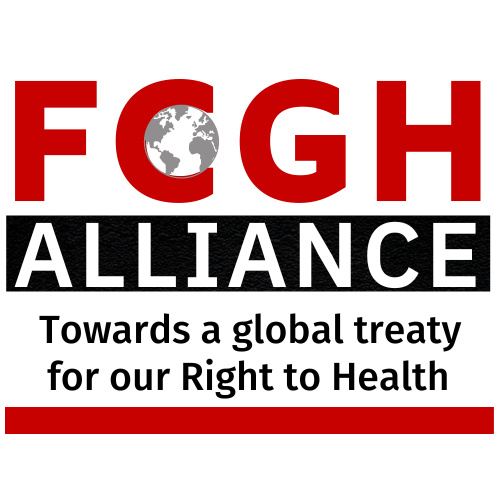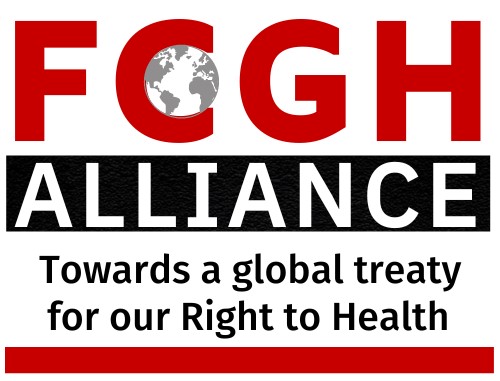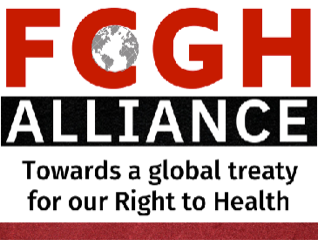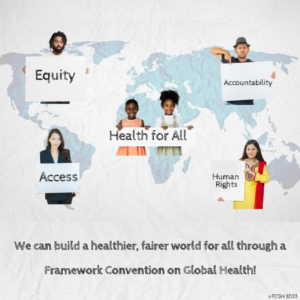Contributed by Ivan Mugabi, Kabale University, Kampala, Uganda
The Framework Convention on Global Health (FCGH) has been proposed as a global treaty to improve health equity and realise the right to health for all. The FCGH Alliance has outlined ten key principles to guide the development of this treaty. The need for such a treaty is becoming increasingly urgent as African countries face restricted fiscal space due to debt service, which has far-reaching implications for the right to health. In this blog, I will discuss why it is now imperative to move towards having a treaty on health, particularly considering these fiscal constraints.
Fiscal Constraints and Health in Africa
African countries are experiencing growing fiscal constraints due to increasing debt service obligations. These constraints have significant implications for the right to health, as governments may struggle to allocate sufficient resources for healthcare services, infrastructure, and workforce development. As a result, health inequities are likely to widen, disproportionately affecting vulnerable and marginalised populations.
The Need for a Treaty on Health
The FCGH, based on the ten key principles proposed by the FCGH Alliance, would help address the challenges posed by fiscal constraints on African countries in several ways.
1. Strengthening Accountability and Capacity
The FCGH would enhance the enforcement of the right to health by clarifying its requirements and establishing regional and international mechanisms to ensure compliance. By building local and national legal, technical, and civil society capacities, the FCGH would promote accountability and improve the implementation of the right to health, even in the face of fiscal constraints.
2. Empowering Communities and Governments
The FCGH would build capacities among communities, civil society, and governments to claim, enforce, and implement the right to health. This empowerment would help ensure that fiscal constraints do not disproportionately affect vulnerable populations and that governments remain accountable for their health obligations.
3. Promoting Health Equality
By clarifying the meaning of non-discrimination and mandating actions to address health inequities, the FCGH would help ensure that fiscal constraints do not exacerbate existing disparities in access to healthcare.
4. Protecting Resources for Health
The FCGH would combat corruption and ensure transparency in health and related sectors, thereby maximising the efficient use of limited resources for health in the face of fiscal constraints.
5. Ensuring Universal Access to Quality Health Services
The FCGH would commit states to providing equal access to high-quality health services for all, regardless of fiscal constraints, and protect individuals from impoverishment due to health spending.
6. Establishing Standards for Universal Health Coverage
By setting high standards for universal health coverage and establishing a timeline for achieving universal access to quality health services, the FCGH would help ensure that fiscal constraints do not impede progress towards this goal.
7. Facilitating Resource Accountability
The FCGH would establish targets for national health financing and health development assistance, helping to hold states accountable for their resource obligations and facilitating international cooperation to realise the right to health.
8. Advancing the Right to Health Beyond the Health Sector
The FCGH would require all government ministries to protect and promote the right to health, ensuring that fiscal constraints do not undermine health equity through policies in other sectors.
9. Ensuring Corporate Accountability
The FCGH would clarify that the right to health takes precedence over corporate rights and require states to ensure businesses do not undermine the right to health, both nationally and abroad.
10. Defining Extraterritorial Responsibilities
The FCGH would clarify states’ responsibilities towards the right to health of people beyond their borders, promoting equitable investment in research and development, and ensuring that fiscal constraints do not compromise global health equity.
Conclusion
The proposed Framework Convention on Global Health offers a comprehensive approach to addressing the growing health inequities and it’s high time that all countries support the FCGH Alliance.

Ivan Mugabi is a lawyer affiliated to both Kabale University and King Ceasor University, Bunga, both located in Uganda; he occasionally serves as a Supervisor of Masters Students in Oil and Gas Students at Kampala Petroleum Institute. His education background includes a Post graduate Bar Course from the Law Development Centre (LDC-Uganda), a Master of Philosophy Degree (M. Phil) from Cardiff University with the School of Law and Politics, a Masters Degree in Human Rights (LLM) from Cardiff University, UK Wales, a Master’s Degree in International Commercial Law (LLM) – University of Glamorgan, UK, Wales, and Bachelor LLB (Hons) from Uganda Christian University: Mukono, Uganda. He likes research and publishing as a means of advancing new epistemological discourses.




